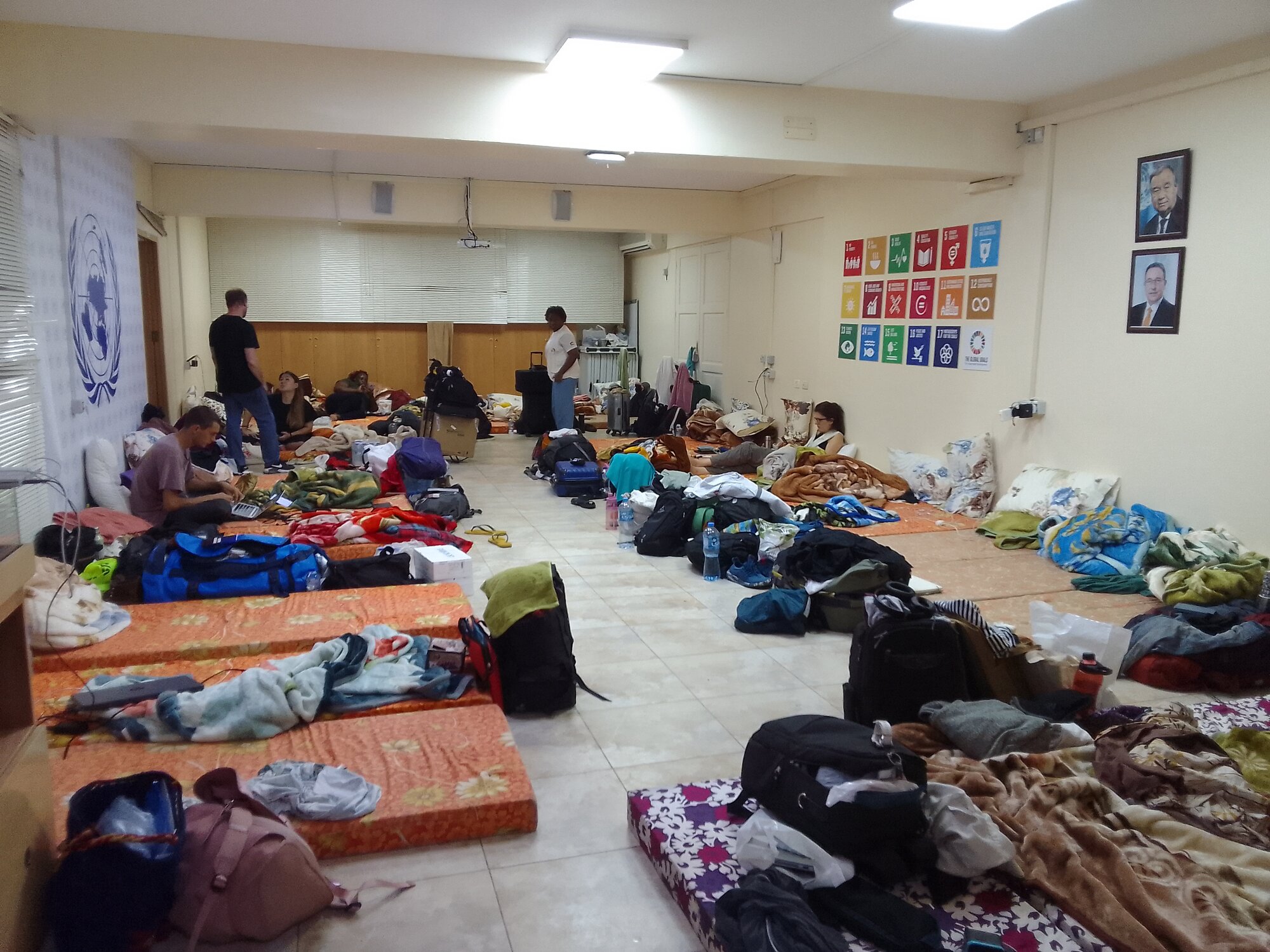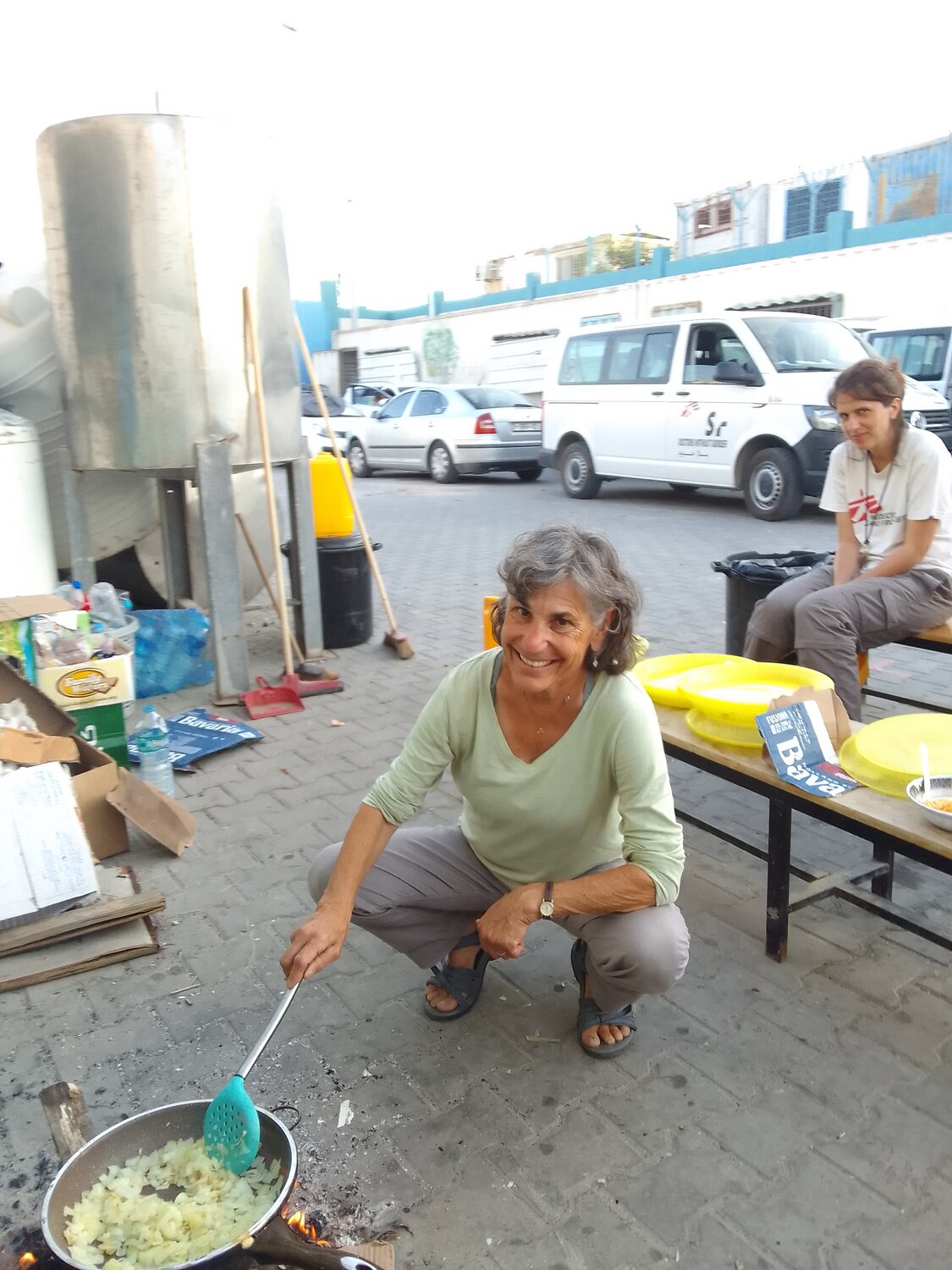Grand Junction doctor returns from Gaza on a mission to share what she witnessed

GRAND JUNCTION, Colo. — Barbara Zind recently spent 26 days in the middle of a war zone in the Gaza strip, but her calm, lighthearted demeanor as she sat at her home in Grand Junction belied the pandemonium she just witnessed — and lived through.
For about eight years, Zind, a pediatrician by trade, has been traveling to Gaza as a volunteer with the Palestine Children’s Relief Fund (PCRF), a humanitarian organization which provides free medical care to Arab children in the Middle East. The start of her trip in late September was typical. She visited children with chronic diseases at refugee camps in Lebanon and Jordan — and planned to volunteer in Gaza for three days. But on Saturday morning, Oct. 7, less than 24 hours after arriving in Gaza City, her plans were upended.
That morning, Zind, along with the Gaza PCRF program director and his daughter, were walking along the beach near Zind’s hotel watching the sunrise when they noticed missiles leaving Gaza headed toward Israel.
“They were going so many directions,” she said. “No one knew what was going on.”
That moment marked the end of Zind’s humanitarian mission and the beginning of a new mission: finding safety and a pathway home to Colorado some 7,000 miles away.
On October 7, the Islamist militant group Hamas, which governs the Gaza strip and has publicly expressed its commitment to the destruction of Israel, killed 1,200 people in a terror attack on Israel and took some 240 hostages. Israel responded with a relentless aerial and ground assault on the Gaza strip. The strip has been controlled by Hamas since 2007. In the ensuing weeks since the attacks, more than 12,000 Palestinians have been killed — mostly civilians, according to Gaza’s Health Ministry. Almost 1.6 million people, more than half of Gaza’s population, have been displaced.
[Related: What is Gaza’s Ministry of Health and how does it calculate the war’s death toll?]
Zind, the daughter of a Muslim and a Jew, is a rare American witness to the situation. She is one of about 400 Americans and their families who were in Gaza when the latest war broke out and who sought help from the U.S. State Department to leave.
“I would just always try to make sure I could communicate with my family every 24 hours or so,” she said. At various moments, she didn’t have any internet and couldn’t communicate, which worried her family. “In general, I said, ‘No news is no news. It's not bad news.’”
Zind thought she would be able to get to Rafah, the Egyptian city at the border of southern Gaza within a few days after the war began. Rafah is a strategic location for evacuating Gaza — it is the only Gazan border crossing that is currently open. The rest have been closed by Israel since the war began. But it’s not easy to evacuate to Rafah. At times, the crossing has been closed, there are backlogs of people trying to leave, and Egypt, Israel, Hamas and the U.S. must coordinate and approve the list of those allowed to leave.
Early on, thinking she’d be able to escape through Rafah, Zind donated most of her clothes and food to a Gazan colleague from PCRF who had eight children.
“I wanted to make sure that they got the clothing and a suitcase and this extra food. And so I just gave it all away,” she said. As a result, for the remaining weeks, she had just two pairs of clothing.
Two million people live in Gaza, a narrow strip of land abutting the Mediterranean Sea that is 25 miles long and 7 miles wide. Nearly half the population that lives there are children under 17.
In 2007, Hamas took power in the Gaza strip. Since then, Israel, with Egypt’s backing, has been tightly controlling the movement of people and goods in and out of the territory. Israel says the restrictions are intended to prevent Hamas from enhancing its military capabilities. The blockade has left the land and people with limited fuel and clean drinking water and economic options. As a result, 80% of Gazans depend on international aid, according to the UN Conference on Trade and Development.

Humanitarian workers at a UNDP office in Gaza City in early October. “There were a lot of people staying in that building. Every office had cushions on the floor,” Zind said.
Photo: Barbara Zind
For most of her time in Gaza, Zind was joined by about 35 other humanitarian workers also stuck in the area, from organizations like Doctors Without Borders, Catholic Relief Services and Mercy Corps. A few local Gazans were part of the group, primarily serving as drivers.
Even though Zind was with trained medical professionals, including surgeons, anesthesiologists, dermatologists, nurses and prosthetists, she said they were all limited in what they could do. “We had really nothing to offer patients if we saw them,” she said. “We just didn't have any medications or any equipment.”
At one point while leaving Gaza City, per Israel’s advanced warning to move south, she said, “the bombs were so close that the car was vibrating.”
She continued, “I felt like I was in a pretty susceptible area. If these buildings are hit, they might fall on top of the car.”
For a few nights, Zind and the rest of the humanitarian group were moved to a large UN vocation school in the city of Khan Yunis in southern Gaza. “We just saw droves of people coming in,” she said. By the end of her first day there, she estimates there were probably 15 to 20,000 people.
Despite the ruinous circumstances, Zind said the Palestinians were resilient, setting up stands along the road and selling coffee and small bites.
For the last two and a half weeks, Zind and the group moved to a UN logistics center and warehouse area further south, close to the Rafah border. They couldn’t stay inside the logistics center, she said, because supplies were running scarce and Gazans might have presumed the foreigners were hoarding all the supplies. Zind and the group moved to a small parking lot on site, where she slept in a small sedan for several nights, and eventually got hold of a mattress and blanket and slept outside on the ground.
“We heard noises all the time,” she said. “We would hear jets and then you'd hear the jet dropping the bomb and then we'd hear rockets.”
People told her that if she heard a bomb, it meant she was in the clear — because by the time she heard it, it meant it had already landed.
Zind said water and food became scarce — and the group she was with had to start rationing.
“You couldn't get food brought in from restaurants, like we could in the beginning, because no one had any fuel. There were no taxis who could bring in the food,” she said. “And then we were a little bit worried because there was no electricity for several weeks. And so you don't know where has that chicken been? Has it been sitting at room temperature for two weeks and now they're cooking it?”
She could see the Gazans around her getting desperate, attacking UN trucks for food, flour, or whatever they could get their hands on.
“We realized we were in a very vulnerable area,” she said. She estimates there was one toilet for every 400-600 people.
Despite the circumstances, Zind found ways to keep busy and pass the time. She said she helped clean bathrooms, took Arabic lessons and helped distribute food. At one point, she was leading people through stretching exercises. She recalls that somebody said, ”well, you're from Colorado, so you probably do yoga.”
On Nov. 1, in the early morning, Zind and other members of her group got word from their embassies that they were approved to evacuate. At 7 a.m., they left in two cars and drove to the Rafah border. After 12 hours of waiting with little food or water, they headed to Cairo. Zind landed safely in Denver Nov. 3, welcomed at the airport by her family, full of relief and exhaustion. She said she felt bad for leaving behind one Italian and one Palestinian humanitarian worker from the West Bank who were not able to evacuate at that time.

Dr. Zind cooking in southern Gaza near the border with Egypt.
Photo: Barbara Zind
Last year while touring hospitals with PCRF, Zind received a folded note from a Palestinian doctor. Zind said it read: “Tell Americans that we are not all terrorists.”
“I think that's something that people don't understand. They're just people,” she said. “They are people just trying to have a normal life.”
While Zind said she doesn’t condone what Hamas did to Israel, she said, “This is a war that is targeting civilians. When you're withholding water and food and fuel to civilians, then you're declaring war on them and their survival.”
Dr. Zind has spoken with various media outlets about her experience — both while in Gaza and since her return. While she said it has been tiring, she added, “I feel like I'm still doing something to help [the Palestinians] even though I'm not there.”
In Grand Junction, she’s become a kind of local celebrity — receiving gifts and cards from strangers. “Someone picked up our tab at the bar last week,” her husband Paul Preston said, laughing.
Zind hasn’t missed a beat since returning to Colorado. RMPBS recently followed Zind leading a young child through the aisles of a Safeway grocery store. Zind helps run the program We Can Mesa County, teaching young kids about nutrition and exercise. She’s also raising money for PCRF, the organization she continues to hold close to her heart.
Zind would like to return to Gaza, but said it’s still too early to discuss.
“I would love to go back, but we'll have to talk about it. It is very trying on my family,” she said. For now, she’s resting and recovering and looking forward to some time away at her family cabin in Lizard Head Pass with a pisco sour in hand.
Andrea Kramar is the investigative multimedia journalist at RMPBS. andreakramar@rmpbs.org.
Lizzie Mulvey is the executive producer of investigations at RMPBS. lizziemulvey@rmpbs.org.